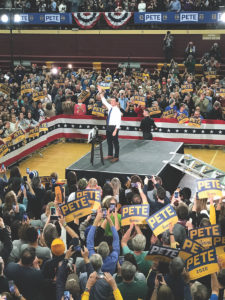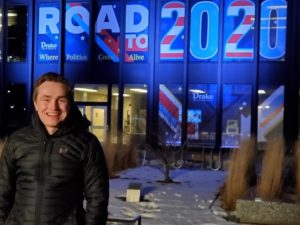
DES MOINES — Political involvement among Nauset High students is not a given. While some of us are in what you might call a political bubble, and a few might be passionate about an issue when it’s in the news, many don’t bother with politics at all.
Most students attribute their lack of political engagement to the belief that their voices don’t matter. It’s easy to feel trapped; Massachusetts is so consistently blue that our votes won’t make a difference, taking away any excitement about helping to choose the next president, even if they want a Democrat.
This political pessimism is hard to find in Iowa, where I traveled to represent Cape Cod young Democrats at this week’s caucuses.
What I saw there were young people who had had lots of opportunities to dip their toes in the political waters. By the time I landed there, Des Moines’s youth had already heard from the candidates in person and begun to form the opinions they would express on caucus night.
The day before the caucuses, South Bend Mayor Pete Buttigieg held a rally at a local high school. His questioners ranged in age from middle school to college. They asked about coverage of pre-existing conditions under the mayor’s plan for expanding health care, and which Beatles song was his favorite. He said he felt “Come Together” was most appropriate.
Not all the college students I met in Iowa were the left-leaning activists that stereotypes would suggest. Many were weighing issues like more seasoned voters. Will Follett, a Warren supporter and student at Drake University, stressed issues not always associated with younger people.

Climate and student debt “are incredibly important,” he said. “I’d also add the economy, as a lot of us are worried about being able to get good, well-paying jobs after we graduate.”
Talking with Will highlighted another aspect of candidates’ character that many young people mentioned: consistency. He said his support of Warren comes in part from her steadfast message of big structural change. He said he takes comfort in Warren’s staying with that idea and not switching between liberal and moderate solutions as other candidates have.
Will’s views as a young voter make sense, considering the support Sen. Bernie Sanders has won among young people. Another Drake student who was caucusing for Sanders said, “I know that when he is in the White House, he will fight for us, because he always has.” Not only were youth thinking practically about what they want in a candidate, those who could vote were siding with those they could connect with on a personal level.
Monday night saw a student for each of the leading candidates speak on why they deserve the support of Iowa’s young Democrats.
Afterwards, a young man from South Florida spoke up for Andrew Yang, saying he never thought he would be in Iowa, until, he said, he had his “hope stolen” from him when his school “got shot up.” Frustrated with the lack of meaningful response from career politicians, his hope was reignited when he “got to see a candidate not give up any beliefs, not do any focus group nonsense, but give us a new idea for where we can go.”
I met a young woman who spoke on behalf of Joe Biden. She said she supported him because she also has suffered from a stutter all her life. In Joe she saw a candidate she could connect with. She had lost her father to cancer when she was just four, just as Joe had lost his son. These connections made the former vice president a more human candidate in her eyes.
Young people in Iowa and across the nation are developing their own unique relationship with politics. Back at his rally the day before the caucuses, Mayor Pete told of a lesson he had learned on the campaign trail.
“If there’s one thing I’ve learned traveling across America,” he said, “speaking to the people impacted by these choices we’re about to make, it’s that politics is not only local, it is personal. Personal for each of us in a different way.”
Maybe he was onto something.
Garrison Guzzeau is a student at Nauset Regional High School.



